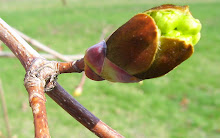Gardening In The Nude (or New Use For Rhubarb)
-
. From Gene Logsdon {Repost} One of the greatest mysteries of life for me
is society’s ambivalence about the naked human body. People line up by the
hundre...
Thursday, March 22, 2018
Friday, March 16, 2018
Gardening is my Prozac. The time I dedicate to training tomato vines or hacking at berry bushes seems to help me stave off feelings of sadness or dread and calm the chatter in my mind. My vegetable beds have even buoyed me through more acute stressors. I’m not alone in appreciating the antidepressant and anti-anxiety effects of gardening—countless blogs are dedicated to this very subject, and a rash of new studies has documented that spending time around greenery can lead to improved mental health.
Perhaps the best place for us each to begin is with our own backyard plot or window box. Planting a rainbow of seeds, avoiding the use of garden chemicals, nourishing the soil with plant matter, digging with our hands, and eating the bounty—while not guaranteed to replace a pharmaceutical grade antidepressant—is a wonderful chance to hang out with “Old Friends.”
******
Forever in search of safe, low-tech solutions that I can offer my patients, I wondered if exposure by eating backyard veggies or digging with glove-free hands could be a potential new antidepressant therapy.
“What our research suggests is that eating, touching, and breathing a soil organism may be tied to the development of our immune system and our nervous system. But you have to understand that we fed our mice much more of that organism than you are likely to find in a peck of dirt—it was more like a drug dose.”
These creatures, which interact with us through our skin, lungs, and gut, are what Graham Rook, physician, microbiologist, and professor emeritus at University College London, refers to as “Old Friends.” I met Rook last year at an evolutionary medicine meeting at the University of Arizona where he presented a series of compelling studies in support of his “Old Friend” theory of immune dysregulation: that a mismatch between our DNA and our modern microbe-depleted environment is responsible for a recent increase in chronic health problems, including autoimmune diseases and depression.
On a large scale, we can begin to do this by increasing the diversity of what we grow on our farms because agriculture, covering more than a third of the earth’s land surface, is an obvious reservoir for biodiversity. Our prevailing system of crop monoculture has severely limited the variety of organisms hiding beneath the soil, lying on the plants, and roaming the fields. The herbicides and pesticides used in monocultures narrow this spectrum further. We can start to shift to a more diversified system of farming by patronizing farms that grow a range of crops and by educating friends, neighbors, medical providers, and lawmakers about the health importance of this type of agriculture.--source
Thursday, March 1, 2018
Subscribe to:
Comments (Atom)









































































































































































































































































